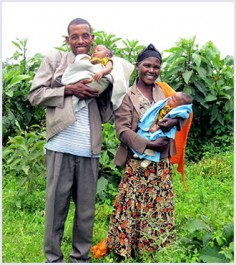 Chaltu came to our maternal health risk assessment clinic at Ganji when she was 34 weeks pregnant. Her last pregnancy had ended in a stillbirth at home and, even though it was a two hour walk from her village, she was intending to come to the health clinic for this delivery. Chaltu was surprised to be told that she was in fact expecting twins. In rural Ethiopia childbirth can be hazardous and even more so when twins are expected. Without the support of a skilled midwife or doctor at time of delivery, babies can die as a result of long and obstructed labour and the mother’s life can also be at risk.
Chaltu came to our maternal health risk assessment clinic at Ganji when she was 34 weeks pregnant. Her last pregnancy had ended in a stillbirth at home and, even though it was a two hour walk from her village, she was intending to come to the health clinic for this delivery. Chaltu was surprised to be told that she was in fact expecting twins. In rural Ethiopia childbirth can be hazardous and even more so when twins are expected. Without the support of a skilled midwife or doctor at time of delivery, babies can die as a result of long and obstructed labour and the mother’s life can also be at risk.
Using a portable ultrasound machine, the professional volunteer from Maternity Worldwide was able to show Chaltu that one of the babies was in a transverse position (that is lying across the uterus) while the other was breech (lying feet down). This meant that Chaltu would almost certainly require a caesarean section and she was advised to come to the hospital in 3 weeks time. When she arrived at the hospital the babies were found to still be in the same positions. A caesarean was carried out and Chaltu safely delivered two healthy babies, a boy of 1.9 kg and a girl of 1.7kg. Four days later Chaltu, her husband and the twins were able to return to their village.
In rural Ethiopia women are often discharged quite early after their caesarean sections. Many families live in small and remote villages considerable distances from the nearest health post or clinic making it difficult for mothers to get post natal care and information about both maternal and child health. Two weeks after they had returned home from the hospital, Chaltu’s husband made the long journey to the health centre to get advice as he was concerned about his wife’s condition. Chaltu had been experiencing considerable pain around her caesarean scar and was struggling to produce enough milk for the two babies. Having assessed all the information, the Maternity Worldwide volunteer advised Chaltu’s husband to ensure his wife got plenty of rest, food and fluids.
Two days later Chaltu’s husband returned to the clinic as he was still concerned about his wife. At the end of the ante natal care clinic she was running, the Maternity Worldwide volunteer drove over to the family’s home with him. Chaltu was clearly tired and anxious. She was in some pain around her operation scar but this was healing well despite a minor infection. Chaltu was given some antibiotics for the infection, iron and vitamin tablets to increase her energy levels and some pain killers. The twins were doing well and Chaltu was producing enough milk for them.
Due to Maternity Worldwide’s programme of running a cycle of maternal health clinics in rural communities, Chaltu and her family were able to get the reassurance, support and medicines that they needed for both the mother and her babies to thrive.

